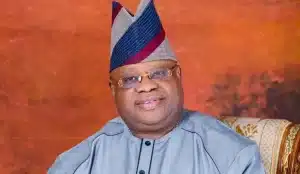NIGERIA@62:Women’s leadership role, A tool towards successful poll
By Adeyemi Adekunle

In 1929 when Aba women riot broke out, observers at that time felt it was a share arrogance for women at that time to be seen in such a lofty journey without been curtail off their excesses, which as at then have angered the (brutish) British power whose tax policy was almost sending Nigerians into exile.
A revolt which starts as a mare discussion among some pockets of women became an historical synergy that made thousands of Igbo women organized a massive revolt against the policies imposed by British colonial administrators in southeastern Nigeria, making it been the most serious move ever made to British rule in the history of the colony.
There would not have been such a great outing for these great women, mothers,and indefatigable daughters of Africa but for the instituted system of indirect rule in Southern Nigeria. This pervasive British administrators, made “warrant chiefs,” became a tiny bone difficult for everyone to swallow, making our owns sons thorns on each others flesh, most essentially Igbo individuals appointed by the governor.
All these mod-us-operandi of leadership evolved from January 1, 1914, when the first Nigerian colonial governor, Lord Lugard, made himself lord instead of governor general.His foot-soldiers did not only seized properties, but imposed draconian local regulations, and began imprisoning anyone who openly criticized them. These Colonial administrators went ahead to impose special taxes on the Igbo market women, women whose responsibility were to supply foods to the growing urban populations in Calabar, Owerri, and other Nigerian cities.
By November of 1929, when it was obvious to the women that the draconian leadership styles of the British government, thousands of Igbo women congregated at the Native Administration centers in Calabar and Owerri as well as smaller towns to protest both the warrant chiefs and the taxes on the market women.
This riot prompted colonial authorities to dropped their plans to impose a tax on the market women, and to curb the power of the warrant chiefs. This uprising was not just the first major challenge to British authority in Nigeria and West Africa,but it was the build up for self governance for most west African countries that are sovereign states today.
As Nigeria clocks 62 years of Independence its crucial to harness the role of women as tool towards a successful outing in forthcoming general election.As the heartbeat of the black dominated continent, our women must be allow to make crucial decision of whom to lead them because at the end they are at the receiving end of this whole journey.
In less than 148 days from now, Nigeria Electorates will approach the ballot boxes to slot in their choice candidates in 774 local governments across the federation, gender equality laws should be an acceptable tool that must take it tolls at the poll to make the contribution of countering discrimination against women and to guarantee equal and fair treatment of men and women, so that they can fully exercise their human rights during and after the election. Elimination of discriminatory practices and procedures that could otherwise undermine women’s right to participate in the electoral process should be avoided.
Nigeria women are valuable members of society, they deserve to participate equally in public life. Still, it is notable that their participation generates more effective and equitable outcomes, from sustainable electoral management. Research demonstrates that due to socially prescribed gender roles, women assess risk differently to men and typically prioritize the welfare of their families and communities in resource-management decisions. Such differences in decision-making extend to national politics: a 2019 study found that national parliaments with more women pass more stringent climate policies. 2023 election will be a tool that improve women’s access to healthcare, education and political representation strengthen their adaptive capacity.
Unfortunately, women continue to face barriers to equal participation in electoral decision-making, and women-led community organizations commonly struggle to access electoral education. Support for women’s initiatives and access to resources can drive effective governance.
Madam Margaret Ekpo,Chief (Mrs) Funmilayo Ransome Kuti, and lots of our women paid huge sacrifices to make sure Nigeria co-exist despite the multi-ethnics presence in Nigeria, the only way to pay them back is to make sure that the labour of our heroes past never go unnoticed.

A Nigerian trained investigative journalist, who cover various news beats in Nigeria.








